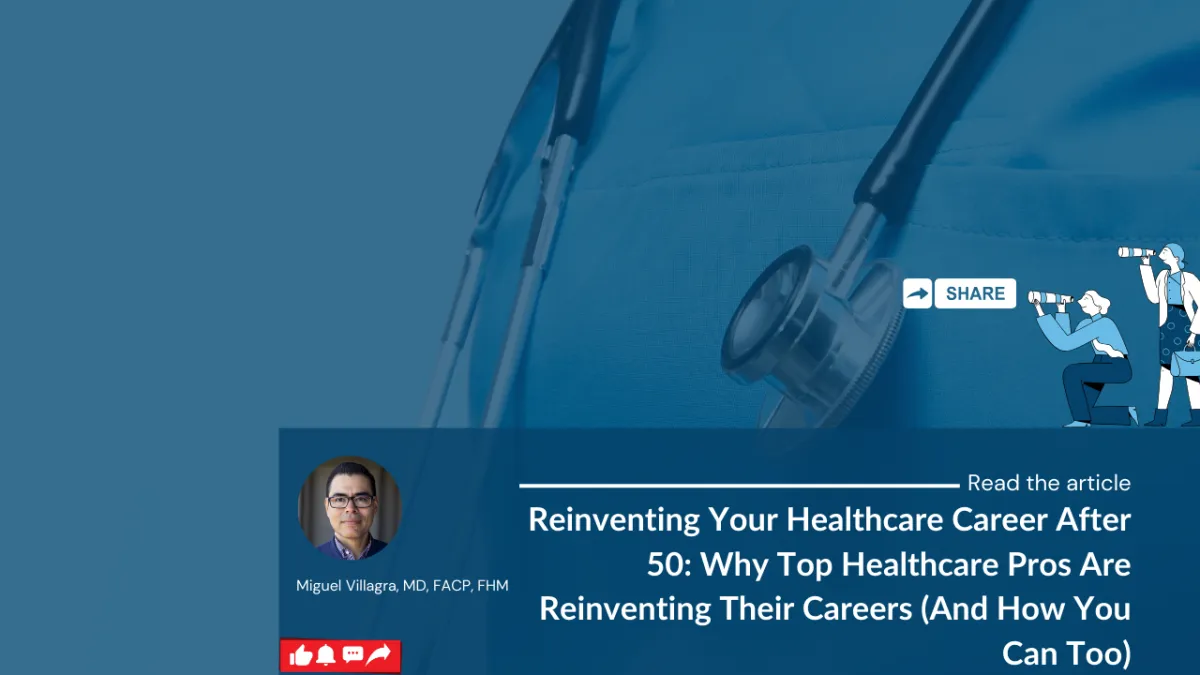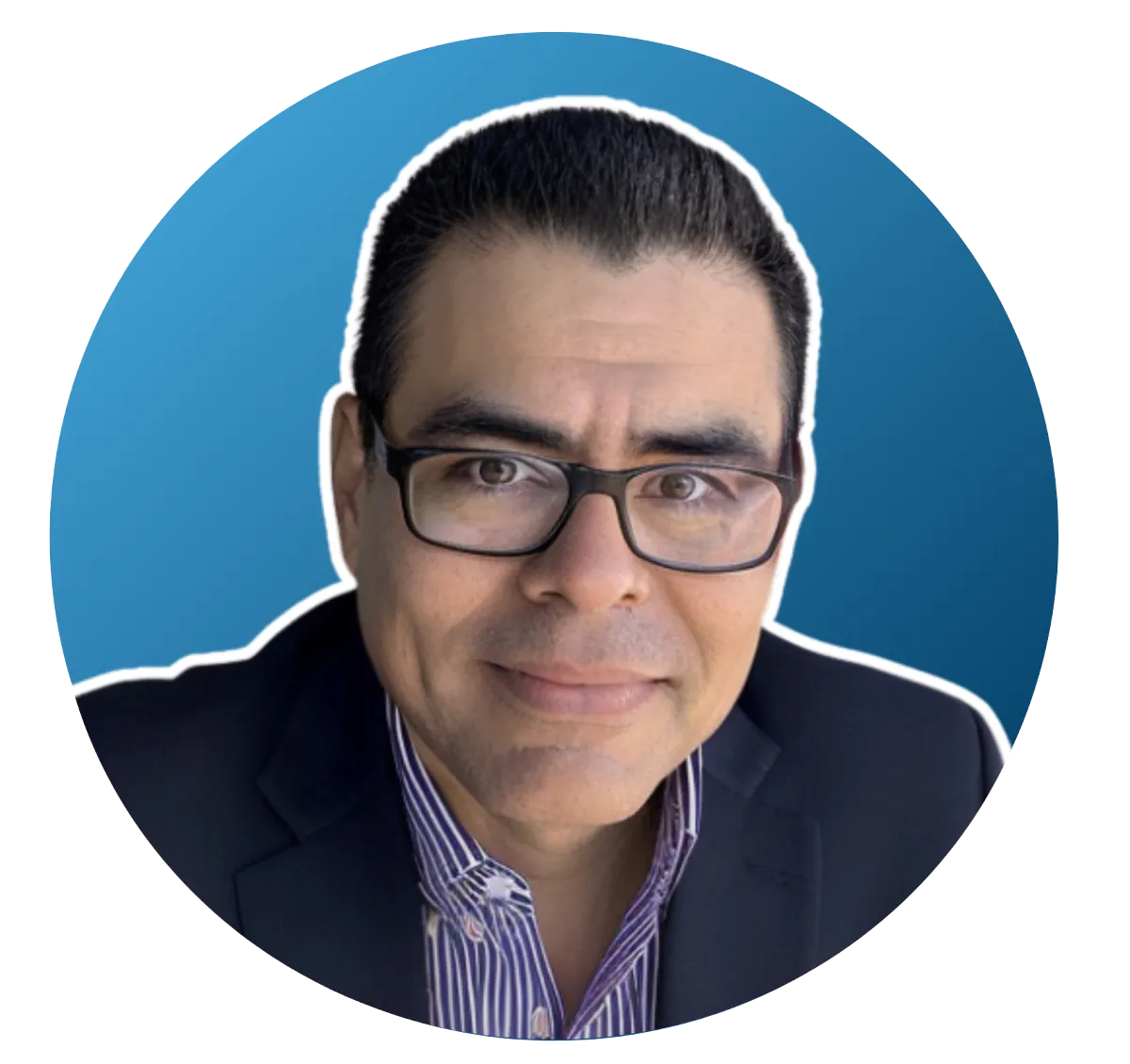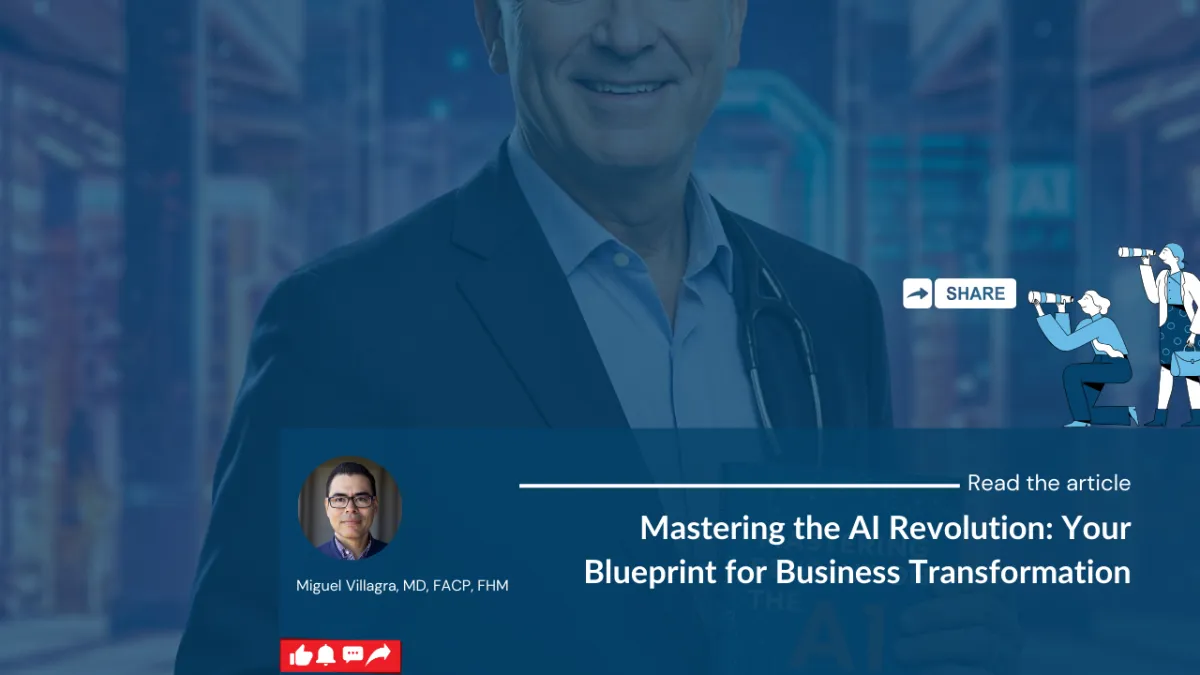
Are you ready to transform healthcare and make a lasting impact?
Join the Healthcare Innovation An Introduction for Physicians Online Course!
INSTRUCTORS:
Miguel Villagra, MD, FACP, FHM
Uli K. Chettipally, MD, MPH
BLOG POST
BLOG POST

Reinventing Your Healthcare Career After 50: Why Top Healthcare Pros Are Reinventing Their Careers (And How You Can Too)
For healthcare providers, reaching the later stages of your career presents a unique opportunity to reflect on your achievements and consider how you want to shape the next phase of your professional journey. Reinventing your career after 50 isn’t about starting over; it’s about building on the foundation of your experience, exploring new opportunities, and aligning your work with your evolving priorities.

Whether you’re seeking flexibility, a less physically demanding role, or a chance to make an impact in a different way, this guide will help you navigate the possibilities and create a plan for a fulfilling late-career transition.
This transformation isn't just about finding a new role—it's about leveraging your wealth of experience and wisdom to create a meaningful next chapter that honors both your professional legacy and personal aspirations. Whether you're considering a gradual shift or a complete pivot, the healthcare field offers numerous pathways for experienced professionals to continue making valuable contributions while achieving better work-life harmony.
Why Reinvent Your Career After 50?
It’s Never Too Late to Redefine Success
Healthcare professionals dedicate decades to caring for patients and mastering their craft. However, as priorities shift—whether due to physical demands, family considerations, or a desire for new challenges—many providers find themselves ready for a change.
Key Motivations for Late-Career Reinvention:
Flexibility: Explore roles that accommodate personal priorities, such as travel, caregiving, or reduced hours.
Impact: Use your expertise to influence healthcare on a systemic level, through leadership, education, or advocacy.
Fulfillment: Reignite your passion by pursuing areas that align with your interests, such as emerging technologies or wellness initiatives.
Reframe the Journey: Reinvention isn’t about walking away from your career; it’s about building on your accomplishments to create a new chapter.
The key is recognizing that your extensive experience isn't just a chapter closing—it's the foundation for an exciting new beginning. Many healthcare professionals find that their second act becomes the most rewarding part of their career, offering opportunities to share wisdom, explore interests, and create lasting impact in ways they never imagined.
Step 1: Reflect on Your Strengths and Priorities
Self-Reflection as the First Step
Your years of experience in healthcare have equipped you with a wealth of skills, insights, and relationships. Understanding your strengths and priorities will help you identify roles that resonate with you in this phase of your career.

Questions to Ask Yourself:
Which aspects of my current or past roles bring me the most satisfaction?
What strengths—such as communication, problem-solving, or mentorship—do I want to continue using?
How important are factors like flexibility, reduced physical demands, or making a broader impact?
Examples of Late-Career Strengths:
Patient Communication: Transition into teaching or coaching roles where you can share your expertise with the next generation.
Clinical Expertise: Use your knowledge to consult with healthcare organizations, helping them refine care models or adopt new technologies.
Decision-Making: Leadership positions, such as department head or administrator, benefit greatly from your ability to think critically and guide teams.
Pro Tip: Write down your answers to clarify your values and goals, and use them as a foundation for exploring new opportunities.
Remember that reflection is an ongoing process—revisit these questions periodically as your priorities and interests evolve. Your answers may change over time, leading you to discover new directions that align with your current goals and values.
Step 2: Explore New Opportunities in Healthcare
The Industry is Changing, and So Can You
Healthcare is evolving rapidly, offering exciting roles that leverage experience while accommodating new priorities.

Emerging Areas to Consider:
Telemedicine: Support remote patient care, offering flexibility while maintaining clinical relevance.
Public Health and Policy: Advocate for systemic changes, address health equity, or lead community health initiatives.
Health Technology: Collaborate with tech companies to design tools that enhance patient care or streamline workflows.
Wellness and Preventive Medicine: Lead initiatives in lifestyle medicine or corporate wellness programs, focusing on prevention over treatment.
Non-Clinical Roles:
Teaching and Mentorship: Shape the future of healthcare by educating students or mentoring early-career professionals.
Consulting: Advise healthcare organizations on operational efficiency, patient experience, or clinical best practices.
Healthcare Administration: Lead at the organizational level, influencing policies and improving systems.
Real-Life Inspiration:
Dr. Anita, a family physician, transitioned into teaching after decades in clinical practice. She now trains medical students, using her experience to guide the next generation while enjoying a less demanding schedule.
Another inspiring example is Mark, a former surgeon who transitioned to healthcare consulting. His clinical expertise now helps hospitals optimize their surgical departments and implement cutting-edge technologies, while allowing him to maintain a flexible schedule that supports his passion for teaching part-time at a local medical school.
Step 3: Upskill to Stay Competitive
Stay Ahead of the Curve
The healthcare industry is constantly evolving, and staying competitive often means updating your skills or gaining new certifications.

In-Demand Skills for Late-Career Transitions:
Telehealth Certifications: Familiarize yourself with virtual care platforms and protocols.
Healthcare Management Training: Degrees like an MHA or certifications in leadership can open doors to administrative roles.
Data Analytics and Health Tech: Courses in EHR systems, AI in healthcare, or data analysis can position you for tech-forward roles.
Where to Find Opportunities:
Online platforms like Coursera or LinkedIn Learning.
Professional associations offering workshops, webinars, and certifications.
Employer-sponsored training programs.
Pro Tip: Even small steps, like attending a webinar on emerging trends, demonstrate your commitment to growth and adaptability.
Remember that investing in your skills doesn't always require a major time commitment or financial investment. Many healthcare organizations offer lunch-and-learn sessions, mentorship programs, or subsidized training that can help you stay current while managing your existing responsibilities.
Step 4: Network and Volunteer Strategically
Leverage Connections and Explore New Areas
Networking is crucial when transitioning into a new career path, especially later in your career. Your existing relationships can open doors to new opportunities, and volunteering can provide exposure to roles you’re considering.

How to Build Your Network:
Professional Associations: Join groups that align with your interests, such as the American College of Healthcare Executives (ACHE) or specialty-specific organizations.
Alumni Networks: Reconnect with former classmates or colleagues who can share insights or connect you with opportunities.
Mentorship Programs: Seek mentors in fields you’re exploring, or offer mentorship yourself to build reciprocal relationships.
Volunteering Opportunities:
Teach workshops at local universities or training programs.
Participate in research projects or leadership committees.
Engage with non-profits or community health initiatives.
These volunteer opportunities not only expand your network but also provide hands-on experience in potential new roles. Consider starting with short-term commitments to test different areas before making larger career shifts. Remember that volunteering can often lead to paid positions or valuable recommendations from respected colleagues.
Step 5: Create a Clear Plan for Reinvention
From Vision to Reality
Having a clear roadmap can turn your aspirations into achievable goals.

Steps to Build Your Plan:
Set Specific Goals: Define what you want from this new chapter—flexibility, impact, or a less demanding role.
Identify Steps: Outline the skills, connections, and experiences you need to achieve your goals.
Create a Timeline: Break your transition into manageable phases with deadlines to stay on track.
Monitor Progress: Regularly assess your plan and adjust as needed.
Example:
If you aim to transition into telemedicine:
Obtain a telehealth certification within 3-6 months.
Shadow a colleague in virtual care to gain insights.
Apply for part-time telemedicine roles to build experience.
Consider starting with shorter shifts or part-time roles to ease into the transition while maintaining work-life balance. Remember that building confidence in a new specialty takes time, so be patient with yourself during the learning curve. Stay connected with mentors who can provide guidance and support throughout your journey.
Overcoming Challenges of Late-Career Transitions
Your Experience is Your Greatest Asset
Changing your career later in life may feel intimidating, but your experience and expertise set you apart.
Common Challenges and Solutions:
Fear of Starting Over: Reframe the transition as building on your strengths. Highlight how your experience brings value to new roles.
Technology Gaps: Address tech skills proactively through targeted training. Many organizations offer beginner-friendly resources.
Impostor Syndrome: Remember that your career accomplishments are a testament to your resilience and capability. Seek feedback and celebrate small wins to build confidence.
Age shouldn't be a barrier to growth—it's an advantage that brings wisdom and perspective. Your years of experience give you unique insights that younger professionals are still developing. When facing challenges, draw strength from your track record of overcoming obstacles throughout your career.
Conclusion: Reinvention is a Celebration of Your Journey
Reinventing your healthcare career after 50 is a chance to align your work with your evolving goals and passions. By reflecting on your strengths, exploring emerging opportunities, and creating a clear plan, you can transition into a role that feels both fulfilling and impactful.

Ready to Begin Your Reinvention Journey?
At A Doctor’s Journey, we specialize in helping healthcare professionals navigate career transitions with clarity and confidence. Whether you’re exploring new fields, upskilling, or seeking guidance on late-career decisions, our personalized coaching programs are here to support you every step of the way.
Take the first step toward your next chapter today. Schedule a free consultation now.
Schedule Your Free Consultation


Reinventing Your Healthcare Career After 50: Why Top Healthcare Pros Are Reinventing Their Careers (And How You Can Too)
For healthcare providers, reaching the later stages of your career presents a unique opportunity to reflect on your achievements and consider how you want to shape the next phase of your professional journey. Reinventing your career after 50 isn’t about starting over; it’s about building on the foundation of your experience, exploring new opportunities, and aligning your work with your evolving priorities.

Whether you’re seeking flexibility, a less physically demanding role, or a chance to make an impact in a different way, this guide will help you navigate the possibilities and create a plan for a fulfilling late-career transition.
This transformation isn't just about finding a new role—it's about leveraging your wealth of experience and wisdom to create a meaningful next chapter that honors both your professional legacy and personal aspirations. Whether you're considering a gradual shift or a complete pivot, the healthcare field offers numerous pathways for experienced professionals to continue making valuable contributions while achieving better work-life harmony.
Why Reinvent Your Career After 50?
It’s Never Too Late to Redefine Success
Healthcare professionals dedicate decades to caring for patients and mastering their craft. However, as priorities shift—whether due to physical demands, family considerations, or a desire for new challenges—many providers find themselves ready for a change.
Key Motivations for Late-Career Reinvention:
Flexibility: Explore roles that accommodate personal priorities, such as travel, caregiving, or reduced hours.
Impact: Use your expertise to influence healthcare on a systemic level, through leadership, education, or advocacy.
Fulfillment: Reignite your passion by pursuing areas that align with your interests, such as emerging technologies or wellness initiatives.
Reframe the Journey: Reinvention isn’t about walking away from your career; it’s about building on your accomplishments to create a new chapter.
The key is recognizing that your extensive experience isn't just a chapter closing—it's the foundation for an exciting new beginning. Many healthcare professionals find that their second act becomes the most rewarding part of their career, offering opportunities to share wisdom, explore interests, and create lasting impact in ways they never imagined.
Step 1: Reflect on Your Strengths and Priorities
Self-Reflection as the First Step
Your years of experience in healthcare have equipped you with a wealth of skills, insights, and relationships. Understanding your strengths and priorities will help you identify roles that resonate with you in this phase of your career.

Questions to Ask Yourself:
Which aspects of my current or past roles bring me the most satisfaction?
What strengths—such as communication, problem-solving, or mentorship—do I want to continue using?
How important are factors like flexibility, reduced physical demands, or making a broader impact?
Examples of Late-Career Strengths:
Patient Communication: Transition into teaching or coaching roles where you can share your expertise with the next generation.
Clinical Expertise: Use your knowledge to consult with healthcare organizations, helping them refine care models or adopt new technologies.
Decision-Making: Leadership positions, such as department head or administrator, benefit greatly from your ability to think critically and guide teams.
Pro Tip: Write down your answers to clarify your values and goals, and use them as a foundation for exploring new opportunities.
Remember that reflection is an ongoing process—revisit these questions periodically as your priorities and interests evolve. Your answers may change over time, leading you to discover new directions that align with your current goals and values.
Step 2: Explore New Opportunities in Healthcare
The Industry is Changing, and So Can You
Healthcare is evolving rapidly, offering exciting roles that leverage experience while accommodating new priorities.

Emerging Areas to Consider:
Telemedicine: Support remote patient care, offering flexibility while maintaining clinical relevance.
Public Health and Policy: Advocate for systemic changes, address health equity, or lead community health initiatives.
Health Technology: Collaborate with tech companies to design tools that enhance patient care or streamline workflows.
Wellness and Preventive Medicine: Lead initiatives in lifestyle medicine or corporate wellness programs, focusing on prevention over treatment.
Non-Clinical Roles:
Teaching and Mentorship: Shape the future of healthcare by educating students or mentoring early-career professionals.
Consulting: Advise healthcare organizations on operational efficiency, patient experience, or clinical best practices.
Healthcare Administration: Lead at the organizational level, influencing policies and improving systems.
Real-Life Inspiration:
Dr. Anita, a family physician, transitioned into teaching after decades in clinical practice. She now trains medical students, using her experience to guide the next generation while enjoying a less demanding schedule.
Another inspiring example is Mark, a former surgeon who transitioned to healthcare consulting. His clinical expertise now helps hospitals optimize their surgical departments and implement cutting-edge technologies, while allowing him to maintain a flexible schedule that supports his passion for teaching part-time at a local medical school.
Step 3: Upskill to Stay Competitive
Stay Ahead of the Curve
The healthcare industry is constantly evolving, and staying competitive often means updating your skills or gaining new certifications.

In-Demand Skills for Late-Career Transitions:
Telehealth Certifications: Familiarize yourself with virtual care platforms and protocols.
Healthcare Management Training: Degrees like an MHA or certifications in leadership can open doors to administrative roles.
Data Analytics and Health Tech: Courses in EHR systems, AI in healthcare, or data analysis can position you for tech-forward roles.
Where to Find Opportunities:
Online platforms like Coursera or LinkedIn Learning.
Professional associations offering workshops, webinars, and certifications.
Employer-sponsored training programs.
Pro Tip: Even small steps, like attending a webinar on emerging trends, demonstrate your commitment to growth and adaptability.
Remember that investing in your skills doesn't always require a major time commitment or financial investment. Many healthcare organizations offer lunch-and-learn sessions, mentorship programs, or subsidized training that can help you stay current while managing your existing responsibilities.
Step 4: Network and Volunteer Strategically
Leverage Connections and Explore New Areas
Networking is crucial when transitioning into a new career path, especially later in your career. Your existing relationships can open doors to new opportunities, and volunteering can provide exposure to roles you’re considering.

How to Build Your Network:
Professional Associations: Join groups that align with your interests, such as the American College of Healthcare Executives (ACHE) or specialty-specific organizations.
Alumni Networks: Reconnect with former classmates or colleagues who can share insights or connect you with opportunities.
Mentorship Programs: Seek mentors in fields you’re exploring, or offer mentorship yourself to build reciprocal relationships.
Volunteering Opportunities:
Teach workshops at local universities or training programs.
Participate in research projects or leadership committees.
Engage with non-profits or community health initiatives.
These volunteer opportunities not only expand your network but also provide hands-on experience in potential new roles. Consider starting with short-term commitments to test different areas before making larger career shifts. Remember that volunteering can often lead to paid positions or valuable recommendations from respected colleagues.
Step 5: Create a Clear Plan for Reinvention
From Vision to Reality
Having a clear roadmap can turn your aspirations into achievable goals.

Steps to Build Your Plan:
Set Specific Goals: Define what you want from this new chapter—flexibility, impact, or a less demanding role.
Identify Steps: Outline the skills, connections, and experiences you need to achieve your goals.
Create a Timeline: Break your transition into manageable phases with deadlines to stay on track.
Monitor Progress: Regularly assess your plan and adjust as needed.
Example:
If you aim to transition into telemedicine:
Obtain a telehealth certification within 3-6 months.
Shadow a colleague in virtual care to gain insights.
Apply for part-time telemedicine roles to build experience.
Consider starting with shorter shifts or part-time roles to ease into the transition while maintaining work-life balance. Remember that building confidence in a new specialty takes time, so be patient with yourself during the learning curve. Stay connected with mentors who can provide guidance and support throughout your journey.
Overcoming Challenges of Late-Career Transitions
Your Experience is Your Greatest Asset
Changing your career later in life may feel intimidating, but your experience and expertise set you apart.
Common Challenges and Solutions:
Fear of Starting Over: Reframe the transition as building on your strengths. Highlight how your experience brings value to new roles.
Technology Gaps: Address tech skills proactively through targeted training. Many organizations offer beginner-friendly resources.
Impostor Syndrome: Remember that your career accomplishments are a testament to your resilience and capability. Seek feedback and celebrate small wins to build confidence.
Age shouldn't be a barrier to growth—it's an advantage that brings wisdom and perspective. Your years of experience give you unique insights that younger professionals are still developing. When facing challenges, draw strength from your track record of overcoming obstacles throughout your career.
Conclusion: Reinvention is a Celebration of Your Journey
Reinventing your healthcare career after 50 is a chance to align your work with your evolving goals and passions. By reflecting on your strengths, exploring emerging opportunities, and creating a clear plan, you can transition into a role that feels both fulfilling and impactful.

Ready to Begin Your Reinvention Journey?
At A Doctor’s Journey, we specialize in helping healthcare professionals navigate career transitions with clarity and confidence. Whether you’re exploring new fields, upskilling, or seeking guidance on late-career decisions, our personalized coaching programs are here to support you every step of the way.
Take the first step toward your next chapter today. Schedule a free consultation now.
Schedule Your Free Consultation

Many physicians considered therapy, self-help resources and support groups before finding our coaching more effective due to its personalized, goal-oriented approach.
Join our innovative life coaching programs that integrate Positive Intelligence to build mental fitness, resilience and emotional intelligence.
TAKE PART IN OUR SURVEYS

Gain insights into your current MENTAL and EMOTIONAL STATE.

This survey aims to understand the current state of HAPPINESS and WELL-BEING among physicians and to gather INSIGHTS on effective strategies for fostering JOY in the medical profession.
TAKE PART IN OUR SURVEYS

Gain insights into your current MENTAL and EMOTIONAL STATE.

This survey aims to understand the current state of HAPPINESS and WELL-BEING among physicians and to gather INSIGHTS on effective strategies for fostering JOY in the medical profession.

Join our NEWSLETTER!
Stay in the loop with our latest updates, exclusive offers, and expert insights by joining our newsletter! Receive valuable content directly to your inbox and be the first to know about upcoming events and promotions. We never share your info to others. You can also opt out anytime.
You are granting Adoctorsjourney permission to send you occasional emails with updates, resources, and special offers. You can unsubscribe from these emails at any time by clicking the "unsubscribe" link at the bottom of any email we send you. We will not share your information with any third parties without your consent.
Join the Movement: Subscribe for Healthcare Innovation & Career Tips!
Physician Well-being & Resilience: Strategies for managing stress and burnout. Building emotional intelligence and mental fitness.
Positive Leadership for Physicians: Developing positive communication and conflict resolution skills. Leading with empathy and emotional intelligence.
Physician Career Transition or Pivot: Setting meaningful goals and achieving work-life integration. Navigating career challenges and transitions.
CLICK TO WATCH THE VIDEO...
Join the Movement: Subscribe for Healthcare Innovation & Career Tips!
Physician Well-being & Resilience: Strategies for managing stress and burnout. Building emotional intelligence and mental fitness.
Positive Leadership for Physicians: Developing positive communication and conflict resolution skills. Leading with empathy and emotional intelligence.
Physician Career Transition or Pivot: Setting meaningful goals and achieving work-life integration. Navigating career challenges and transitions.
CLICK TO WATCH THE VIDEO...
355 E Plumb Lane #1098, Reno, NV, 89502, USA
915-800-0690
Elevate Your Leadership and Career
Gain the tools and strategies needed to become a more effective and inspiring to our fellow physicians, entrepreneurs and other sectors. Follow us on social media, sign up for our newsletter and engage with our community to stay inspired, informed, and connected on your journey of transformation.
SUBSCRIBE TO OUR NEWSLETTER
You are granting Adoctorsjourney permission to send you occasional emails with updates, resources, and special offers. You can unsubscribe from these emails at any time by clicking the "unsubscribe" link at the bottom of any email we send you. We will not share your information with any third parties without your consent.
Elevate Your
Leadership and
Gain the tools and strategies needed to become a more effective and inspiring to our fellow physicians, entrepreneurs and other sectors. Follow us on social media, sign up for our newsletter and engage with our community to stay inspired, informed, and connected on your journey of transformation.
SUBSCRIBE TO OUR NEWSLETTER
You are granting Adoctorsjourney permission to send you occasional emails with updates, resources, and special offers. You can unsubscribe from these emails at any time by clicking the "unsubscribe" link at the bottom of any email we send you. We will not share your information with any third parties without your consent.
Copyright @ 2024 Adoctorsjourney, LLC
All Right Reserved.














